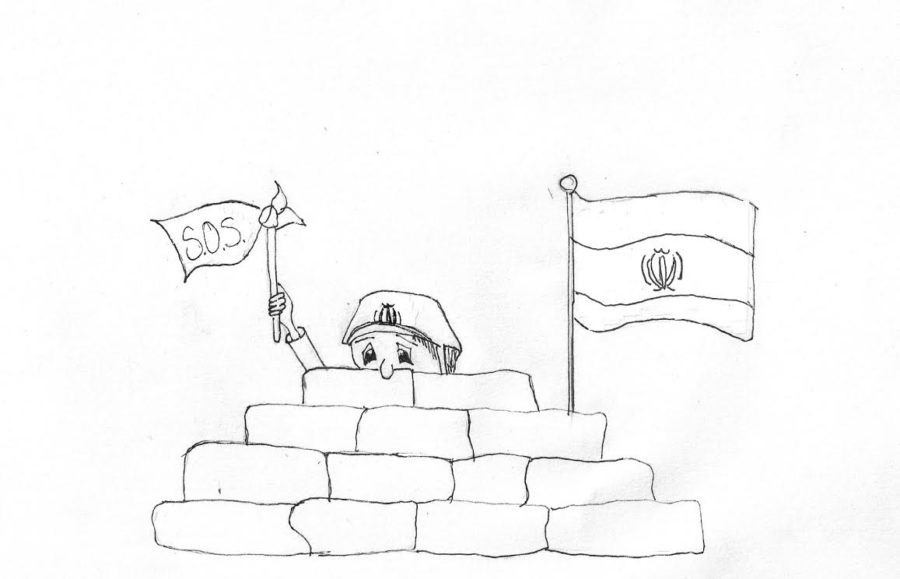Glawe: Intervention is humanitarian
Illustration: Sara Madison/Iowa State Daily
Columnist Glawe argues that U.S. intervention is the humanitarian thing to do and has done more good for the world than bad. He believes that the United States should work toward stopping the “ethnic cleansing” that the Islamic State group is attempting.
September 4, 2014
Last week, I happened upon a conversation between two individuals of millennial stock regarding the ongoing crisis in Iraq. Both agreed that it was high time we call our involvement in that country a failure, and any further attempts to keep our “nation building” efforts alive were futile. They displayed much of the idle protest of the past decade when our armed forces were guaranteeing the welfare of the Iraqi people after the fall of Saddam Hussein. I shifted uncomfortably in my seat as this conversation progressed from bad to worse.
With Amnesty International accusing the Islamic State group of ethnic cleansing and with hundreds of Shiites and Yazidis killed every day, how could someone possibly take up the position that the United States should not intervene?
It is here that I am reminded of one of my favorite essays regarding the topic of humanitarian intervention — written, unsurprisingly, by my favorite writer, Christopher Hitchens. The essay is titled “The Case for Humanitarian Intervention,” and I’d urge those of the isolationist breed to peruse it.
Hitchens reminds us of a time when the United States was the “recipient, not the donor, of humanitarian solidarity.” Indeed, there are many instances when — in her fledgling state — the Land of the Free required the aid of foreigners. Even in weakness, the United States still pondered intervention in places such as Greece to guarantee the same freedoms upon which it was founded. Though it is common among isolationists to quote John Quincy Adams — “She goes not abroad, in search of monsters to destroy” — Adams said this in a time when the United States could not afford to aid other countries in its fight for liberty.
Nowadays, we do have the resources to guarantee such rights. It is a shame that many people, especially those of my own party, think that the United States should never utilize these resources. Yes, empire building is wrong and the United States has been guilty of this crime before. However, there is a difference between those surreptitious intentions and genuine efforts to help people, which oftentimes require military action. It saddens me to see people of my party failing to recognize this distinction.
Those who think the United States couldn’t possibly be a moral arbiter — as it is colloquially phrased, “policing the world” — are, to be blunt, dead wrong. After all, if the U.S. did not have the authority and the moral obligation to intervene in the Rwandan genocide, then when and where would such an action be permitted? The fact that the Clinton administration simply shrugged off the murder of hundreds of thousands of Tutsis is not only reprehensible but also shameful. It yields the impression of the United States as callous, capricious and careless.
The same goes to all of you who, in the midst of mass murder, think, “Not our problem,” while basking in the pride of our heroism in rescuing Europe from that genocidal megalomaniac Adolf Hitler.
For the moment, let’s focus on the Kurds, who are now fighting for their lives against the forces of the Islamic State group. People of my generation who view our efforts to assist the Kurds as futile have failed to recall the horrible atrocities committed against those people.
In 1989, for instance, Saddam Hussein’s Ba’athist government conducted a genocidal campaign against the Kurdish people. We are quickly reminded of the attack at Halabja, which bears recognition as the largest chemical weapons attack against a civilian population in history. Wasn’t the overthrow of Saddam Hussein’s regime, then, a deliverance? Disregarding the “weapons of mass destruction” argument, Saddam Hussein committed crimes against humanity and it was right of the United States to take him down.
The United States, therefore, has the duty to act in concert with other nations to purge the world of monsters such as Slobodan Milosevic, the Hutu extremists, and Bashar al-Assad. Or are we to let some practitioners of genocide a free pass and others not?
The Islamic State brigades are no different. They actively engage in the mass killings of Iraqi civilians — as it has now been reported, “ethnic cleansing.” I have heard some of my friends on the left call for military action against the Islamic State group while condemning the Iraq War. But its all the same to me — guaranteeing the safety and freedom of the Kurdish and Iraqi people. Unfortunately, this requires military action.
For the accusers of warmongering, though, I yield to Hitchens, who recognized in his essay that “war and conflict are absolutely needful engines for progress and that arguments about human rights, humanitarian intervention and the evolution of international laws and standards are all, in the last resort, part of a clash over what constitutes civilization, if not invariably a clash between civilizations.”
Still, faced with the evidence, you isolationists will remain covering your ears and closing your eyes, hoping the killing will be over soon and you won’t have to listen to the cries for help. Fine. Those of us who favor humanitarian intervention will pick up the standard you laid down and we won’t think twice whether or not we should purge the world of genocidal maniacs.







